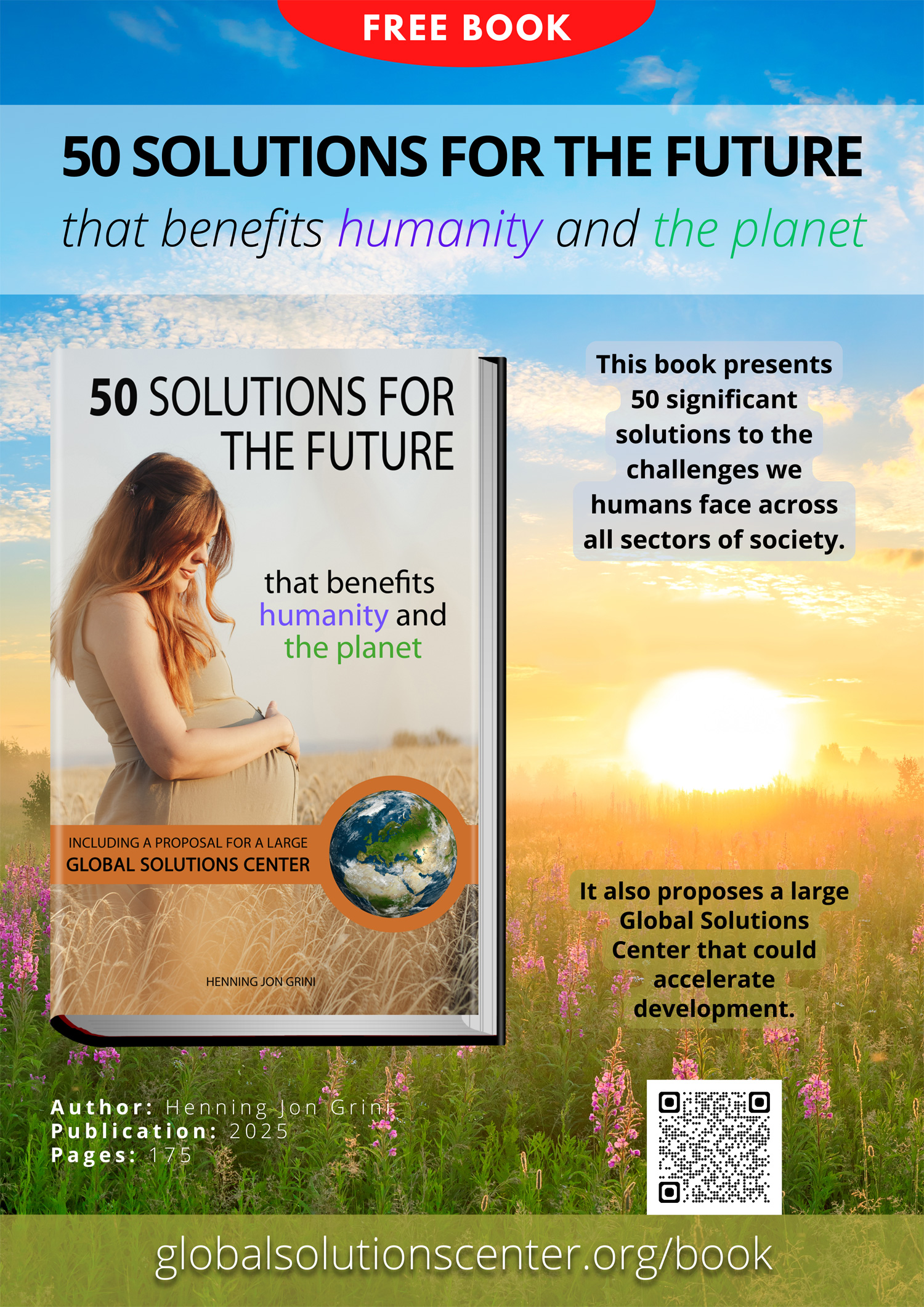FREE BOOK
50
SOLUTIONS
FOR THE FUTURE
that benefits humanity
and the planet
Henning Jon Grini
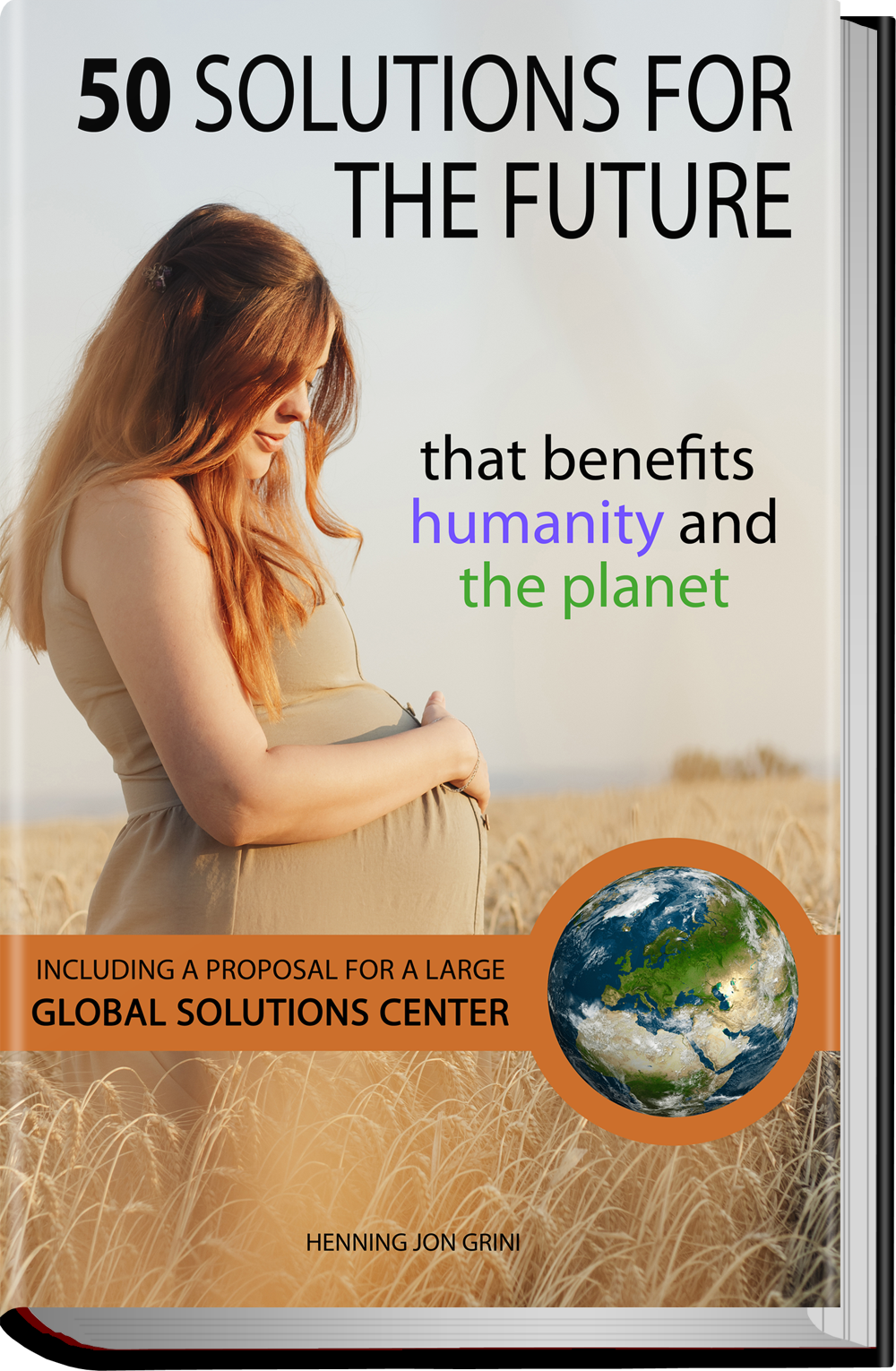
The Potential of the Future
This book presents 50 significant solutions to the challenges we humans face across all sectors of society.
It also proposes a large Global Solutions Center that could accelerate development.
BOOK AD
DOWNLOAD THE BOOK



INTRODUCTION
As we know it, our civilization has been on an incredible journey, for better and worse.
In many ways, the hardships overshadowed the good in the world of yesterday. Life was tough and short for most people. Poverty, wars, diseases, and ignorance were widespread.
The goal of our civilization should be to reverse this and create a society where the good outweighs the bad, so that everyone can thrive. This is entirely achievable in the long run, precisely what this book is about.
Today, we find ourselves at a stage somewhere between these extremes. Many have been lifted out of poverty, yet far too many remain trapped in it. Inequality has reached alarming levels in many places, and several democracies are under pressure. Women still hold little power and face significant oppression in large parts of the world.
The problems are numerous: deep divisions and polarization exist within the populations of some countries, while wars rage in others.
At the same time, we face new challenges, such as climate change, driven by our growing numbers and the increasing negative impact on our planet.
As we can see, there are plenty of challenges and issues to tackle in today’s world, but the same is true for the lives of individuals. We each face our own set of difficulties. Many struggle with alarming health problems, especially lifestyle diseases, and far too many are in financial distress, even though there is more than enough wealth in the world. Loneliness is widespread in society, and suicide rates are disturbingly high in many countries.
Questions can also be raised about our mindset and much of what we, as humans, engage in.
Military production and defense spending have surged in many countries in recent years, while prevention and peacebuilding efforts receive only scraps.
Young people are robbed of valuable time spent on social media, as the companies running these platforms prioritize profit over ethics.
Certain fossil fuel producers are fighting tooth and nail to continue as before, at the expense of future generations.
Far too many people are unhappy in their jobs, which is understandable when, for instance, wise and highly educated individuals are set to create advertisements for products that are not necessarily needed. Many feel a lack of purpose in their lives. Alarmingly, a significant number also struggle with mental health issues, and depression is widespread. Could there perhaps be a connection here?
THE CHALLENGES WE FACE ARE HUGE
From what has been mentioned, several conclusions can be drawn. It is clear that short-term thinking still dominates and that the pursuit of profit exerts too much influence.
One example of this is that if you want to preserve a piece of forest for future generations, you’ll be denied a loan by the bank. However, if you want to cut it down and sell it as timber, you’ll get a yes.
Furthermore, the issue is not a lack of intelligence but rather a lack of ethics, willpower, and a deeper understanding of the interconnectedness between humans and nature.
There is also a failure on the interpersonal level. We are not good enough at taking care of each other. This is evident in wealthy countries where many are homeless while the super-rich indulge in luxury.
It’s also clear that technology is not the solution to everything. In fact, technology can become a problem if human development cannot keep pace. A case in point is the stockpile of nuclear weapons, which are enough to send humanity back to the Stone Age.
We are unable to agree on significant climate cuts, and even when compromises are reached, implementation often falls short in practice.
We are also far behind schedule when it comes to achieving the UN’s Sustainable Development Goals.
THE SOLUTIONS TO THE CHALLENGES ALREADY EXIST
But we can do better than this…
And it’s not as bad as it sounds…
Because challenges and problems help us grow—this applies to both individuals and the society we live in. The bigger picture shows that we are moving forward, albeit sometimes slowly and with occasional setbacks along the way.
While there is much breakdown happening in society, there are also many breakthroughs. Something old must give way to make room for the new. This can present challenges because what is new and unfamiliar often faces resistance.
We humans tend to cling to old thoughts, habits, attitudes, and outdated knowledge. But in a rapidly changing world, development is required. Just as we continually update the apps on our smartphones, we also need to update ourselves.
The new that is emerging must have a foundation built on our best values. But what are the best values? That depends on one’s perspective, which creates challenges, as is seen in politics.
However, there is a way to largely avoid this issue: by looking at what already works in society. It is hard to argue against something that is working. This leads to the question… What are the new things that are working and can help move humanity forward?
This is where this book comes into play. It presents several solutions that are already being implemented and are proving effective. The solutions included in this book is comprehensive and have a more transformative impact on society. Many of these may already be familiar to the readers.
A GLOBAL SOLUTIONS CENTER WILL BE AN ENORMOUS ENRICHMENT FOR SOCIETY
A major and important solution, which has its own chapter in the book, is the idea of a Global Solutions Center. Such a comprehensive, dynamic, and impactful Global Solutions Center does not exist today.
To solve our massive problems and challenges, we must collaborate on an entirely different level than we do now. This is because our problems are global and know no borders, as demonstrated by climate change and pandemics.
This also clearly shows that we need to think holistically and long-term in all areas, as we are interconnected with nature and with each other.
What many people are not aware of is that most of our problems have already been solved. The issue is that these solutions are so fragmented and difficult to access that, in many cases, people end up «reinventing the wheel.» What is needed is the gathering and coordination of solutions that can be shared with the world.
As things stand today, solutions and innovations do not receive the attention they deserve. The media has an unfortunate tendency to focus on trivial and sensational stories (to maximize profit). Too little space is devoted to what truly matters. This should change because what we focus on tends to grow stronger. This is something such a center would help address.
The center’s primary function would be to collect and identify solutions and innovations to our local, national, and global problems and make them as widely and quickly accessible as possible.
The original idea for this Global Solutions Center came from Barbara Marx Hubbard, an American futurist, author, and speaker who passed away in 2019.
As early as 1984, during her candidacy for Vice President at the Democratic National Convention in the United States, she introduced the idea that we need a new social function to «scan for, map, connect, and communicate what works in the U.S. and the world.»
Such a center would save society enormous costs by shortening the learning curve, preventing problems, and accelerating societal development.
It would be a crucial contributor to creating a sustainable society and aiding in repairing the damage we have inflicted on the Earth and all living beings.
This idea of a Global Solutions Center also has its own website with detailed information and illustrations.
THIS BOOK IS A COLLECTIVE PROJECT PRESENTED THROUGH CHATGPT
It is a formidable task to delve into these solutions and write about them. It requires a great deal of time and resources. This is where modern technology comes to the rescue. I have used ChatGPT to write about the solutions and some other parts of the book, which offers significant advantages but also some drawbacks.
One of the advantages is that the content can be more neutral, without being heavily influenced by personal opinions and biases. At the same time, it inevitably reflects the thoughts and opinions of others, as ChatGPT is fundamentally based on those.
In most cases, ChatGPT will rely on professionally written texts based on factual and often scientifically documented sources. This can result in a more balanced text.
However, it has been shown that inaccurate or unfortunate information can also emerge through this modern technology. Therefore, it is always important to maintain a critical perspective on what you read.
At the same time, ChatGPT has its limitations. It lacks personality, emotions, imagination, and soul. While it can be creative, this creativity is based on humanity’s collective information available on the internet.
That is why I also refer to my own science fiction book, which I wrote some time ago. It is free and describes a society where most of today’s problems are solved. More about that book can be found in the chapter Future Possibilities.
Throughout the book, I will include my own comments. These will be clearly marked as my comments. None of the ChatGPT-generated text has been altered; it appears exactly as it was generated.
In a way, I am not the author of this book. It has become a collective project. It represents a compilation of knowledge and wisdom accumulated over time, presented by ChatGPT in this book. My role has been to determine solutions and questions.
The questions I asked ChatGPT are highlighted in yellow, while my own comments are highlighted in turquoise.
There may be updates to this book in the future.
Before presenting the solutions in the book, I believe it’s useful to provide an overview of the problems society has faced in the past, the challenges we currently face, and, most importantly, where we are headed. Therefore, I have asked ChatGPT to include the following summary in three brief chapters:
Problems of the past
The challenges of today
The possibilities of the future
SHARING IS THE FUTURE AND THAT’S THE MAIN REASON THE BOOK IS FREE
Why is this book free? Firstly, it is my firm belief that, as a society, we can do a much better job of sharing. Sharing not only benefits the environment but also demonstrates that we care about one another. Within a family, sharing is common. In the future, the concept of family should expand to encompass all of humanity.
Secondly, it becomes more accessible to everyone, regardless of their financial situation.
Thirdly, I believe the book can spread more quickly when it’s free and there are no copyright restrictions preventing sharing.
Lastly, it is a collaborative project, as most of it has been written by ChatGPT, not by me.
THE MOST IMPORTANT SOLUTION
Throughout my life, I have been drawn to the big questions and have been fortunate enough to have the time and opportunity to reflect and philosophize—something few have the luxury of doing today.
What has especially captured my attention is the future and how we can create a bright society that we can all be proud of.
One thing stands out clearly as the most important factor:
Taking care of one another.
Societies that fail to take care of each other risk collapsing. Put differently, if we focus too much on «me and mine,» we erode society. In contrast, societies that focus on «us and ours» build stronger communities.
Few have illustrated this better on a personal level than Charles Dickens in his classic story A Christmas Carol. In it, the main character, the selfish, greedy, and grumpy businessman Ebenezer Scrooge, lives a bleak and lonely life. This changes completely when he begins to care for those around him. His actions create positive ripple effects for many, and he himself gains a much better and richer life.
America, a country many have admired, has increasingly become like the old Ebenezer Scrooge. They have created a system that favors an ever-growing number of super-rich individuals, while the majority of the population struggles more and more to make ends meet. This leads to frustration, anger, and despair. People lose hope, providing fertile ground for negative and polarizing forces. Let’s hope that, in time, America transforms into the new Ebenezer Scrooge, so it can once again serve as an inspiration.
China is now a country that is on the rise. They have their challenges, and their governance can be questioned, but it seems like they are taking better care of their citizens, compared to the United States. It also seems like they are thinking more long term. More and more people are now looking up to China and let’s hope they can become a country we can look up to in the future as well.
It’s not just each other we should care for but also our planet. We live in symbiosis with nature. Humans depend on the oxygen produced by trees, while trees depend on the carbon dioxide we exhale.
This shows how deeply interconnected we are with one another and with nature, yet we have created too much separation. The good news is that this is beginning to change.
We are now moving away from a time defined by separation, competition, power, and profit. The new era will be characterized by community, unity, collaboration, and sharing.
The solutions presented in this book focus primarily on this shift.
It’s about viewing all of humanity as one big family. It’s about empathy and love. These are what make life worth living and what create well-functioning societies.
I hope this book and the solutions it presents can contribute to this vision.
CONTENT
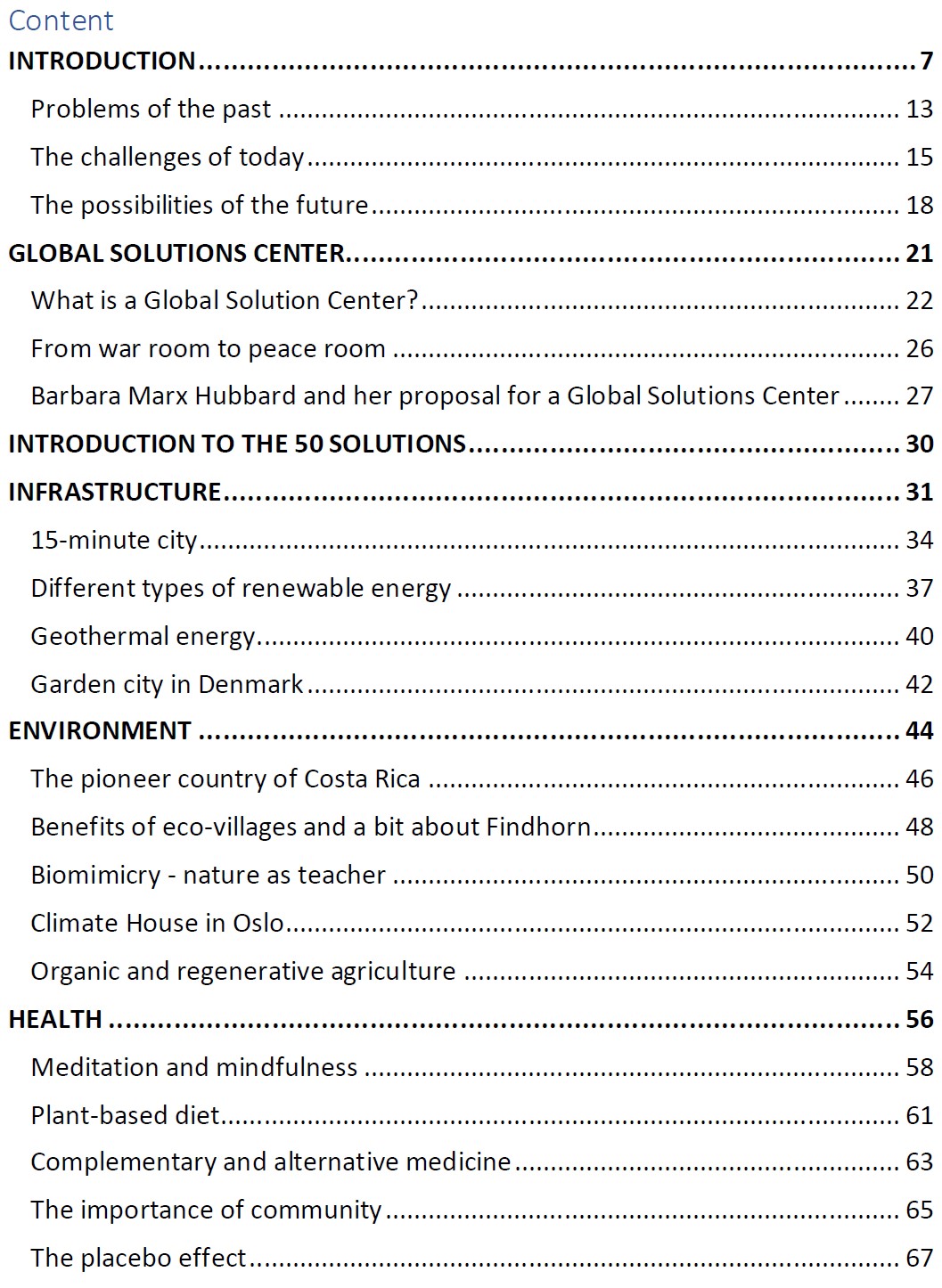
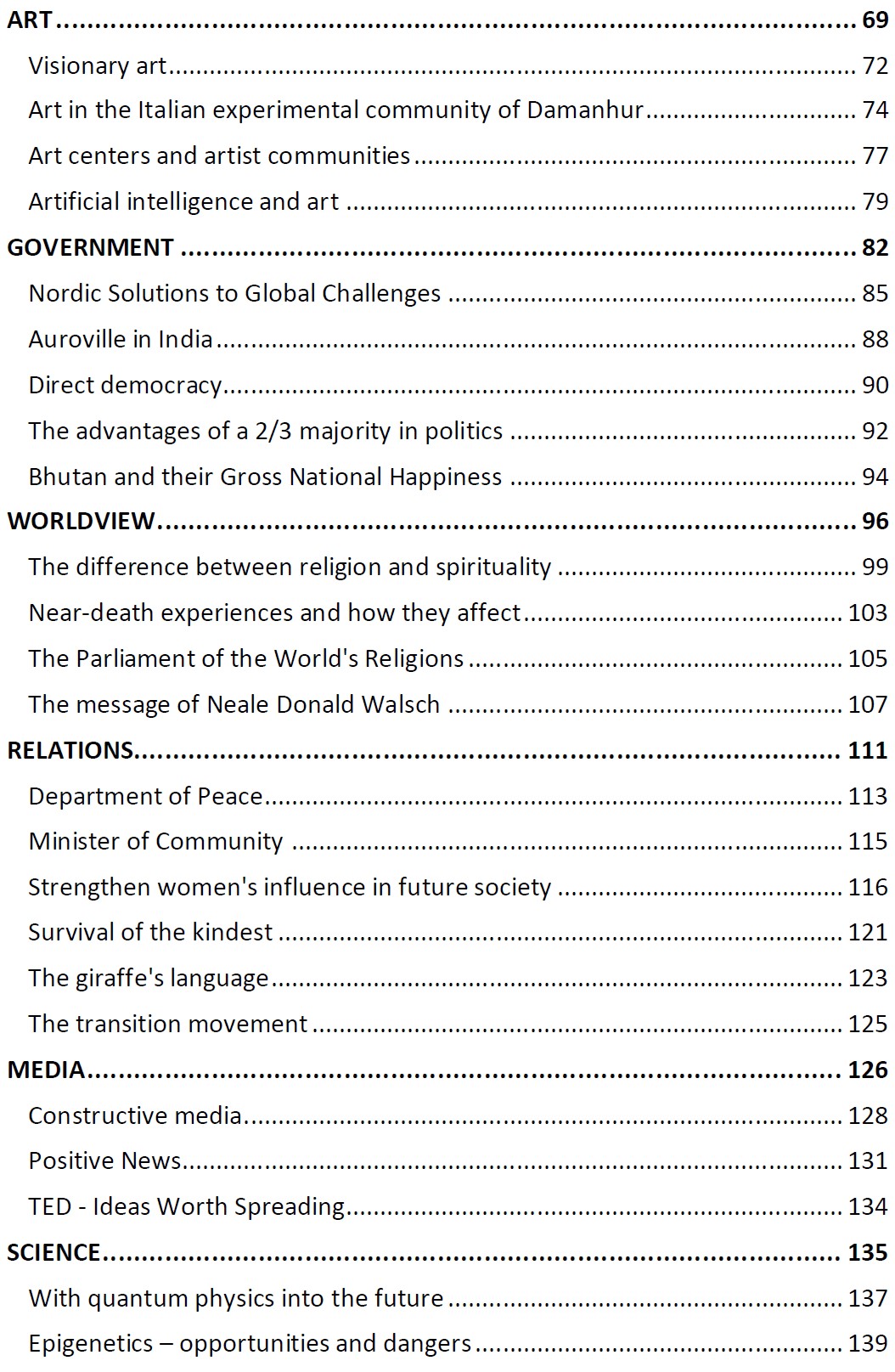
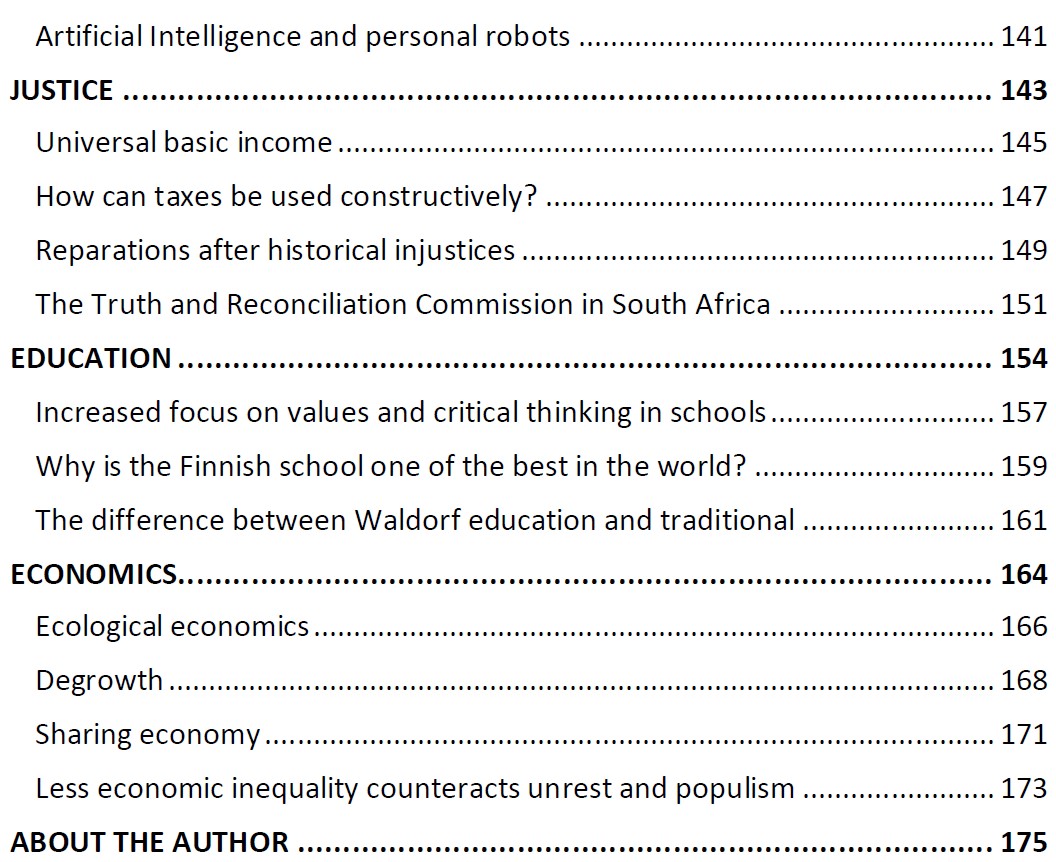
«The world as we have created it is a process of our thinking. It cannot be changed without changing our thinking»
– Albert Einstein

